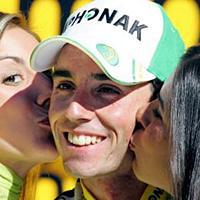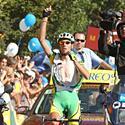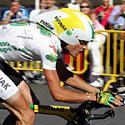
Recently on Cyclingnews.com |
An interview with Santiago Perez Fernandez, October 23, 2004
Spain's braveheart
While Roberto Heras' victory in the Vuelta a Espaņa came as no surprise, it was the phenomenal performance of 27 year-old Santiago Perez that brought people to their feet. Cyclingnews' Hernan Alvarez Macias spoke to one of the bravest riders in the peloton, who was relaxing in his home town of Asturias after a remarkable season.
"Santi" was never really considered a leader for the Vuelta. After all, the Phonak rider was a designated soldier for Tyler Hamilton, and even when he left, the Swiss team still had the Oscar Sevilla card to play. But when 'Baby Face' didn't have the luck or the form, it was a chance for him to take the reins.
He did so well, in fact, that he came close to winning the race; after three stage wins including the final time trial into Madrid - the latter hardly his speciality - 30 seconds was all that separated Heras and himself.
Possessing a calm heart that beats strongly but slowly, Santiago Perez has a natural ability to succeed in cycling. A calm nature was also needed when confronted with the death of his father when he was a child and the passing of his girlfriend two years ago after a horrific car crash.
Cyclingnews: You rode a great Vuelta a Espaņa, right?
Santiago Perez: Yes, no doubt about it. This Vuelta has been a springboard both for my personal life and my sporting career.
CN: Did you expect such good results like the what you accomplished?
SP: Every time one gets in a competition, he tries to do things the best he can. But my goals at the start in Leon were to try to win a stage and overall to help Tyler Hamilton and Oscar Sevilla in their chances for the overall victory in Madrid. I never thought of myself going for the final triumph.
"Every time I spoke with Alvaro [Pino], he always gave me a small chance of riding freely... I tried to get the most of that freedom."- Santiago Perez speaking about his personal strategy at the Vuelta |
CN: It was somehow surprising to see you in the second place in the GC as you had Hamilton and Sevilla as team-mates.
SP: I wouldn't say it was unexpected, because while I was preparing myself for the Vuelta, I recovered very well from the Tour de France and I felt very good day after day. Every time I spoke with Alvaro [Pino], he always gave me a small chance of riding freely, but always considering how our leaders in the race were going, Oscar Sevilla and Tyler Hamilton. During the last days of the race, they couldn't ride any more for different reasons and I had more freedom. I tried to get the most of that freedom, and ended second in the general classification and won three stages.
|
|
|
|
|
CN: You were going higher and higher in the general classification during the last days of the Vuelta. Maybe if the race had 22 stages you would have won it. What do you think?
SP: Well, you never know what could have happened. I don't like to look back on the stages done or to think of another stage. I think that if I could have changed some things in the first stages, Roberto [Heras] could have adjusted some things on other days, too.
I think everyone has his own circumstance. All of us knew long before the start, the Vuelta's route, where it started, where it ended, how the stages are. The final winner was decided throughout the whole route, and I think the best rider has been Roberto Heras because he finished the race in the least time and he is a well deserved winner.
I felt very good during the last days of the race. I tried with all my strength to cut the time Roberto had over me. I hope I am able to work the same way as this time next year, not to make mistakes and try to win.
CN: You dedicated your victories in the Vuelta to your girlfriend, who passed away. How much did she mean to you?
SP: I believe that after the accident she had, I was looking for the stage win, for glory all the time. The bigger, the better. It was good to dedicate the victory to her and to erase my mind of that tragic fact. That triumph finally came and I feel satisfied not only for reaching it, but also for dedicating it to her.
CN: How do you manage in a foreign team like Phonak?
SP: We manage very well. I think we, all the Spaniards, count on Alvaro Pino and on Spain's five soigneurs and two mechanics. I think we have a big Spanish structure [in Phonak] and we truly feel as if we were a Spanish team. The truth is that it is a Swiss squad, but we have very good communication with each other. The fact of having not only riders but also Spanish mechanics really helps us to feel at home.
CN: It seems Roberto Heras has become the best Spaniard of the moment with his third Vuelta win. What do you think?
SP: Yes. I think he has been showing he is a great rider, especially a great climber and that the Vuelta fits him really well. He demonstrated this with his three victories. I think he still has some years to get a forth conquest and beat the record he shares with Tony Rominger.
CN: What do you think about Oscar Freire's gold in Verona?
SP: I think it showed the Spanish team's extraordinary work, which went just as it had been planned, even in the last part of the race with many riders in the right breakaway. And then a tremendous finale as Alejandro Valverde gave a perfect lead-out for Oscar Freire. Freire showed he was the strongest and the best, and got the gold medal for Spain.
CN: How important is the pre-season preparation for a professional rider?
SP: I think it is essential for every rider. Maybe less important for a rider like me who does not have a tendency to gain weight, because the cyclists who tend to gain weight are the ones with more trouble. A good pre-season is very important for riders who wish start their seasons at full strength, but that is not my case. I am a rider without big muscles; I try to do as much lifting exercises and physical preparation as I can, to perform throughout the year with the best possible strength.
CN: Does anything change for you, the riders, with the Pro Tour next year?
SP: Yes, the truth is that the cycling basics change. It is a variation inside cycling and I don't know whether to be in favour or against this because I am not very informed about it. I think cycling is one of the sports that changes the least throughout the years. It is a very traditional sport and there are some changes that I don't know if they are for better or for worse. This is another change and I hope it is positive for the good of our sport.
"I won't deny that I'm happy in the team... so I can not discard the chance to keep on racing for Phonak"- Perez speaking about his decision on his team of choice in 2005 |
CN: How was that hard period on your professional life between the 2002 Giro d'Italia and this year's Vuelta?
SP: I was complicated, because at that Giro, I was in a similar position like the one I had in the past Vuelta and I had to quit the race because of a fall. It was a hard crash that sent me to the hospital. Then, I raced the Tour, I had another crash and I also had to quit the competition. That inconvenience forced me to stop riding for the rest of 2002.
At first, no injury was noticed. But with the training sessions and after some time, it became a knee injury that resulted from the crash. That happened in 2003. This undermined my possibilities in every competition from midway through the season to the end of the year. I felt better only in the last races of the year, in the classics in Italy, and in the Vuelta's last stages. During the Montjuic classic where I finished second, I was able to be in condition again.
This year, I faced this season with much more optimism, thinking that I was finally recovered. I was able to reach the top 10 in many one-week races at the start of the season, even though I didn't feel at my top. I didn't perform as I wished in the Tour, I think I reached the race a bit tired. [Tyler] Hamilton quit the race when we were spending a lot of energy riding beside him. We were affected by that and it made me ride with more enthusiasm in the Vuelta.
In the end, this year was positive, especially because of the Vuelta. I want to come back next year and do my best from the very beginning.
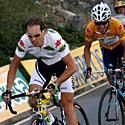
|
CN: Which is the most difficult thing, to reach a great level or to maintain a great level?
SP: I think both are difficult. Cycling is a very tough sport and many conditions should follow in order to get good results. The point about getting results is to know that if you made it one time, you are capable of doing it again. I felt very good in 2002; I was ready to demonstrate again that I had enough power to be among the top positions in a three-week race.
CN: I read you have an excellent heart rhythm for competitive cycling with a resting heart-rate of 31 beats per minute. It is as if you have a natural advantage compared with other riders, right?
SP: Yes, we could say that. Everyone has, as you said, some biological, natural advantages. I have a very big heart that enables me to have less heartbeats than normal people. Then, with hard work, I was able to get it down to 27, 28 heartbeats [per minute].
The 31 that you referred to is the value I got in the test the riders do before the start of every Tour de France - I the one with fewest [beats per minute]. In 2002, I was also the one with fewest with 33 [BPM].
CN: You've had some very tough moments in your personal life. Do these bad times made you stronger?
SP: I think so. When you are happy and then your life is turned upside down, that is when you realize that you should not pay attention to unimportant things. Maybe there are some other things that are actually important and you should live intensively every day not to regret of anything. Everybody suffers the loss of a beloved person and this makes everyone stronger. I think that in such a hard sport like this, to have those problems helps you in some key moments to suffer a bit more over the bike and also to see things in a different way.
CN: You are a great climber; is there a famous climb would like to take a win? Alpe d'Huez is the first one that comes to mind.
SP: Every rider would like to win in a key stage in the Tour, and most of all the ones that are mythical. A stage that goes through Tourmalet or an uphill finish in Alpe d'Huez are cycling's most mythical stages. I would also like to win in Angliru or Lagos de Covadonga, because I am from Asturias and they are climbs right here in front of my house. To succeed in front of my people would be a proud moment and an important victory.
CN: What would you prefer to win, the Giro or the Vuelta?
SP: I like both tours. I have that bad memory from the 2002 Giro and I would like to try it again to get rid of that bad impression from the crash. However, the Vuelta a Espaņa is my nation's tour and also my regional tour. I think I showed this year that the Vuelta fits me very well. Having to choose one, I would select the Vuelta because of the Spanish fans and the fans from Asturias.
CN: Would you like to stay with Phonak?
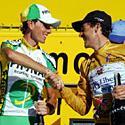
|
SP: Yes, I'm very happy there. We're in discussion [Perez's contract finishes this year], but I've received good offers from big teams and I don't want to reject any at the moment. I won't deny that I'm happy in the team. I have a very good relationship with the director, with my team-mates, so I can not discard the chance to keep on racing for Phonak.
CN: Which are your plans for this winter?
SP: I am currently resting and trying to see in which team I will race for next year. I am beginning my planning for next season. My pre-season didn't change these last two seasons. What happened this year is that for some reason, I was luckier and I rode in the front. I hope to obtain the same results as this year with the same work that I did.
CN: Which are the races that you would like to ride in 2005?
SP: My calendar will be the same, regardless of which team I ride for. I'll race some one-week tours at the beginning of the season in order to face the Tour de France with the greatest possible intensity. And then come here for the Vuelta a Espaņa that is my nation's tour. I have many expectations, especially because of my second place in the last edition.

